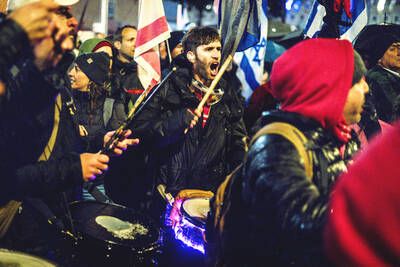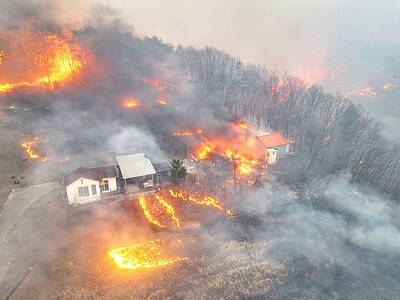It is not in the same league as Arab spring uprisings in Egypt and elsewhere, but Malaysia’s fancifully named “hibiscus revolution” has the potential, at least, to inflict a winter of discontent on the government of Malaysian Prime Minister Najib Razak. That’s something British Prime Minister David Cameron hopefully considered when Najib came touting for business yesterday. Bilateral trade and investment is important. Respect for basic human rights more so.
Najib reacted with characteristic heavy-handedness when tens of thousands of people took to the streets of Kuala Lumpur at the weekend demanding reformasi — democratic reform — and an end to a defective electoral system which guarantees that Najib’s party, UMNO, representing the Malay majority, stays in power indefinitely.
About 1,700 people were arrested and many injured as police used baton charges, water cannon and teargas to break up peaceful protests. One protester, identified as Baharuddin Ahmad, 59, collapsed and later died near the Petronas Towers in central Kuala Lumpur while fleeing teargas.
Amnesty International said police had beaten many demonstrators and demanded an investigation into claims they had failed to provide prompt assistance to Baharuddin.
“Prime minister Najib’s government rode roughshod over thousands of Malaysians exercising their right to peaceful protest,” Amnesty said. “This violent repression ... flies in the face of international human rights standards and cannot be allowed to continue. David Cameron should tell prime minister Najib that these human rights violations are unacceptable.”
The protests are the product of rising tensions linked to mooted early elections, spending cuts, political upheavals in neighboring Thailand and Singapore, establishment cronyism, curbs on public assembly and debate, and state-imposed censorship considered draconian even by regional standards.
Marimuthu Manogaran of the Democratic Action party, representing the ethnic Chinese minority, said many of the protesters were first timers. “Young people [are] coming out there to demand their rights ... and I think that is a good sign for Malaysia,” he told Luke Hunt of the Diplomat magazine.
Another report, denied by police, said a hospital where protesters had taken refuge was attacked by security forces. Bersih 2.0, the opposition “coalition for clean and fair elections,” called for a royal commission of inquiry and vowed to continue its reformasi campaign, come what may.
Far from admitting fault, Najib has threatened more strong-arm tactics.
“Don’t doubt our strength. If we want to create chaos, we can. UMNO has three million members. If we gather one million members, it is more than enough. We can conquer Kuala Lumpur,” he said.
Such threats seem ill-advised. When elected in 2009, Najib promised to bridge political, ethnic and religious divisions. Now he is in danger of exacerbating them, as his old boss, former Malaysian prime minister Mahathir Mohammed, suggested in a recent interview.
Malaysia is not immune to the international zeitgeist, any more than its economy is immune to global trends. This latter consideration explains why Najib is in London and it gives Cameron and other European leaders leverage should they choose to use it.
Malaysians need only look north to see how Thai voters defied the political-military establishment and voted in a leader of their choice. If Malaysians look south to Singapore or east to Hong Kong, they see entrenched ruling elites under determined challenge by activists emboldened by the spirit of change.
Led intelligently and openly, Malaysia could be a paradigm for south-east Asia. Led repressively, it could fall apart. Najib must get on the right side of history. The Mubarak model doesn’t work.

DEATH CONSTANTLY LOOMING: Decades of detention took a major toll on Iwao Hakamada’s mental health, his lawyers describing him as ‘living in a world of fantasy’ A Japanese man wrongly convicted of murder who was the world’s longest-serving death row inmate has been awarded US$1.44 million in compensation, an official said yesterday. The payout represents ¥12,500 (US$83) for each day of the more than four decades that Iwao Hakamada spent in detention, most of it on death row when each day could have been his last. It is a record for compensation of this kind, Japanese media said. The former boxer, now 89, was exonerated last year of a 1966 quadruple murder after a tireless campaign by his sister and others. The case sparked scrutiny of the justice system in

The head of Shin Bet, Israel’s domestic intelligence agency, was sacked yesterday, days after Israeli Prime Minister Benjamin Netanyahu said he no longer trusts him, and fallout from a report on the Oct. 7, 2023, Hamas attack. “The Government unanimously approved Prime Minister Benjamin Netanyahu’s proposal to end ISA Director Ronen Bar’s term of office,” a statement said. He is to leave his post when his successor is appointed by April 10 at the latest, the statement said. Netanyahu on Sunday cited an “ongoing lack of trust” as the reason for moving to dismiss Bar, who joined the agency in 1993. Bar, meant to

DITCH TACTICS: Kenyan officers were on their way to rescue Haitian police stuck in a ditch suspected to have been deliberately dug by Haitian gang members A Kenyan policeman deployed in Haiti has gone missing after violent gangs attacked a group of officers on a rescue mission, a UN-backed multinational security mission said in a statement yesterday. The Kenyan officers on Tuesday were on their way to rescue Haitian police stuck in a ditch “suspected to have been deliberately dug by gangs,” the statement said, adding that “specialized teams have been deployed” to search for the missing officer. Local media outlets in Haiti reported that the officer had been killed and videos of a lifeless man clothed in Kenyan uniform were shared on social media. Gang violence has left

‘HUMAN NEGLIGENCE’: The fire is believed to have been caused by someone who was visiting an ancestral grave and accidentally started the blaze, the acting president said Deadly wildfires in South Korea worsened overnight, officials said yesterday, as dry, windy weather hampered efforts to contain one of the nation’s worst-ever fire outbreaks. More than a dozen different blazes broke out over the weekend, with Acting South Korean Interior and Safety Minister Ko Ki-dong reporting thousands of hectares burned and four people killed. “The wildfires have so far affected about 14,694 hectares, with damage continuing to grow,” Ko said. The extent of damage would make the fires collectively the third-largest in South Korea’s history. The largest was an April 2000 blaze that scorched 23,913 hectares across the east coast. More than 3,000